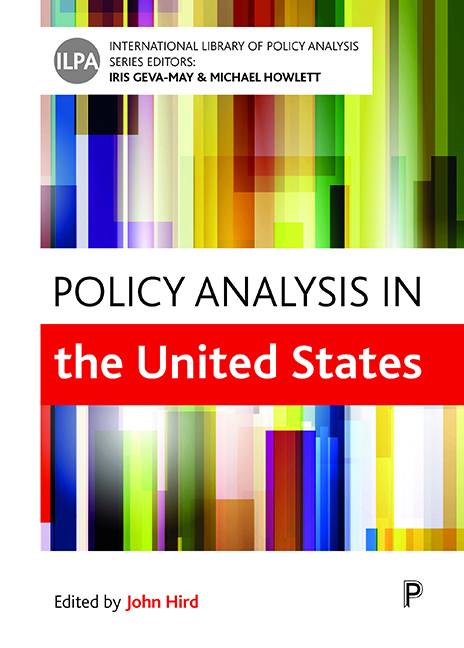Book contents
- Frontmatter
- Contents
- List of tables and figures
- Notes on contributors
- Editors’ introduction to the series
- Introduction
- Part One History, styles, and methods of policy analysis in the United States
- Part Two Policy analysis by governments
- Part Three Policy analysis outside of government
- Part Four Policy analysis education and impact internationally
- Index
Eight - Committees and legislatures
Published online by Cambridge University Press: 12 April 2022
- Frontmatter
- Contents
- List of tables and figures
- Notes on contributors
- Editors’ introduction to the series
- Introduction
- Part One History, styles, and methods of policy analysis in the United States
- Part Two Policy analysis by governments
- Part Three Policy analysis outside of government
- Part Four Policy analysis education and impact internationally
- Index
Summary
Many people may not immediately associate Congress and policy analysis. The well-documented failure of the Congress to enact policies to solve the nation's problems may lead observers to believe that there must not be much policy analysis going on in the Congress. In point of fact, however, the Congress has great analytical capacity. As a full-time legislature with a large staff, Congress has a great deal of both ex ante and ex post policy analysis available. The problem is not so much the availability of this information, but the rather episodic use that the Congress makes of this information, or the tendency of individual members or committees to make it fit some preconceived policy preferences.
Congressional policy analysis includes, to some extent, the analysis that is done by staff of the House and Senate themselves—particularly by committee staff— but the main congressional analytical capacity lies in its support agencies—the Congressional Budget Office (CBO), the Government Accountability Office (GAO), and the Congressional Research Service (CRS). After a brief look at committee staff capacity, the chapter will focus on the work of the support agencies and then conclude with a look forward, discussing issues related to the future of policy analysis for the Congress.
Congressional committees
The Congress is organized by committee. These ‘little legislatures’ are the entities within the Congress in which expertise on particular substantive issues resides (Deering and Smith 1997). While committees certainly have analytical capacity, it is a stretch to call even what most committees do ‘policy analysis.’ It is policy analysis to the extent that it involves the assessment of policy alternatives and that congressional committees, in performing their oversight role, hold hearings where they receive input on the performance of programs from other analytical organizations, including the support agencies discussed below. It tends not to have some other characteristics that typify policy analysis, such as objectivity and depth.
It is the authorizing committees, rather than the appropriations committees, who are normally the major players as they are tasked with understanding programs in greater depth as a part of their need to periodically authorize federal programs and agencies. Since ‘authorization’ (if done right) involves setting goals for programs and assessing what has worked and what has not, it is an appropriate locus of policy analysis.
- Type
- Chapter
- Information
- Policy Analysis in the United States , pp. 153 - 170Publisher: Bristol University PressPrint publication year: 2018

